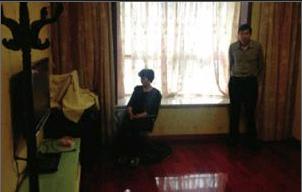Embryos in the Courthouse
2014-07-28ByYuanYuan
By+Yuan+Yuan

On March 20, 2013, Shen Jie and his wife Liu Xi died in a tragic car accident in Yixing, east Chinas Jiangsu Province—five days before Liu was to have a fertilized egg transferred into her womb using in vitro fertilization technology. Though they have been laid to rest for more than a year, the grieving process has not ended for their families, who decided to go to court to fight for the frozen embryos that would have been used in the procedure.
Shen and Liu got married in 2010, but experienced difficulty conceiving naturally and eventually decided to try assisted reproductive technology. In February 2012, they had embryos made through artificial fertilization by the Nanjing Drum Tower Hospital in Nanjing, capital of Jiangsu.
Since the birth of the first baby conceived outside a womans body in 1987, science has given childless couples around the world a new hope. For the first time, fertility experts could combine an ovum and sperm in a petri dish and create an embryo that had the potential to become a living child.
In January, Shens parents filed a lawsuit with a court in Yixing against Lius mother and father. Both wanted to use the embryos to continue the bloodline of their children. The court later added the Nanjing Drum Tower Hospital, where the frozen embryos are stored, as a third party.
The arguments
The plaintiffs request for the embryos was rejected finally on May 15.
“Since the couple died and could not realize their plan to have a child, the embryos they left behind cannot be inherited,” the court said in a ruling. “The frozen embryos were intended for the dead couple to have a baby with the help of technology. They have limited rights and are not inheritable.”
“A frozen embryo is a ‘special object that can develop into life,” said Lu Yaqin, the judge presiding over the case. “It is the ethical nature of the embryo that distinguishes it from other objects that can be inherited.”
The hospital also refused to hand the embryos over to anyone, explaining in court that the only way to make such embryos grow into children would be to transplant it into a surrogate mother. The procedure is illegal in China and against medical ethics.
“The nature of frozen embryos has not been officially defined and the hospital could not transfer the frozen embryos to the family, as China has strict requirements for the disposal and management of them,” said Zheng Zhelan, an attorney for the hospital.endprint
“The only way to keep the embryos alive is to have them implanted in a surrogate mother, but that is against the law in China,” Zheng added. He also mentioned that although the hospital has the ability to preserve embryos for years, the couple signed a document in 2012 authorizing their embryos to be destroyed a year later.
“The one-year deadline has passed, and the parents of the dead couple are worried that the embryos may be destroyed,” said Guo Wei, the lawyer for Shens parents. “The couple only intended to buy more time for the embryos by transferring them to other hospitals.”
Guo said that there is no law in China banning embryos from being inherited. He urged the hospital to return the embryos to either of the deceased couples parents.
“We just want to retrieve the embryos and store them at a hospital of our choice. Then we will cross our fingers and wait for the ban on surrogacy to end,” said Hu Xingxian, Shens mother.
Shen and Liu were both single children in their families. Hu said that as both their parents are already old, this is the only hope for them to have biological grandchildren.
“This is our only hope. If in the future, the state allows surrogate pregnancy, we will at least have something to work with. We can even donate the embryos to relatives who cannot get pregnant themselves,” Hu said.
Legal vacuum
In 2012, a couple in Rizhao, east Chinas Shandong Province, faced a different awkward situation to Shen and Lius parents. They had frozen embryos before getting a divorce. After their separation, the wife wanted to transfer an embryo to her womb but her ex-husband protested. This earlier case also ended in a dispute over the ownership of the frozen embryos.
“Whether a frozen embryo should be regarded as a person, property, or something else has been a matter of debate for a long time,”said Ma Yinan, a professor of law at Peking University. “It carries the potential for life, which distinguishes it from other objects and as such it shouldnt be inherited like other objects.”
“As for the case in Yixing, the wishes of the two families are understandable. But if the embryos were inherited, it might cause more problems in the future, leading to things like trading them,” said Zhai Xiaomei, an expert from the National Health and Family Planning Commission.
In China, in line with the family-planning policy effective since the late 1970s, most urban families were only allowed to have one child for the following 30 or so years. With the concerns over possible misfortune befalling their only child in the future, some parents chose to have embryos frozen in hospitals in case of the worst.endprint
A new policy released in late 2013 allows couples with one being the only child of his or her parents to have a second kid, leading many couples with embryos frozen in hospitals to unfreeze them for reproduction.
“Although the storage contract says that the frozen embryos can only be kept for one year and then the hospital has the right to discard them if the couple commissioning the embryos dont pay a fee to prolong their preservation, the hospital normally keeps the embryos for as long as it can,” said Huang Qing, a doctor at the Third Affiliated Hospital of Guangzhou Medical University.
Huang said that, with the new policy, a growing number of couples with frozen embryos kept in the hospital have showed up to pay for further preservation. “In April and May, about 500 couples came to pay, while in the past, only 20 to 30 couples came each month.”
Yang Guiyan, a doctor at Zhuhai Maternity and Child Healthcare Hospital in Guangdong Province, revealed that from 2011 to 2013, the hospital helped create more than 2,000 frozen embryos and the number has been increasing since the beginning of this year. “Storing all these frozen embryos has brought pressure on the hospital,” Yang said. “Every embryo has the possibility of being turned into a baby. Discarding them is the last choice.”
“The case in Yixing has exposed a legal vacuum in the regulations, which ambiguously fail to define a frozen embryo as either a human or an object,” said Chen Zhihua, a lawyer from the Beijing Lawyer Association. “The Chinese mainland has no law defining ownership of frozen embryos and the case has generated appeals for the law to keep pace with developing fertility technology.”
The four parents in Yixing said that they would appeal to a higher court together. “We wont give up the fight as it is our only hope,”said Shens parents.endprint
